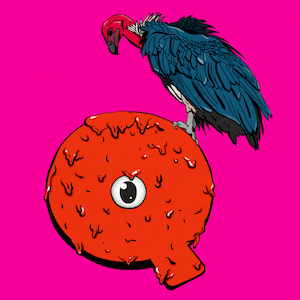As the COVID-19 pandemic started to ravage the world in earnest last spring, a new conspiracy theory known as the “Great Reset” slowly developed alongside it. The details of the theory vary from one conspiratorial echo chamber to the next. But it broadly holds that a vague, shadowy cabal of global elites either engineered the pandemic or are opportunistically using it as a means to destroy everything good in the world—and build a post-crisis totalitarian dystopia in which average people live benighted lives of slavery solely to serve the interests of the ruling class.
The Great Reset has gained serious traction across the far right—especially in the wake of Joe Biden’s election victory and as nations struggle to respond to the third wave of the pandemic. As it has, its proponents have been increasingly consumed by a particularly bizarre notion: that sinister elites want to force ordinary people to stop eating meat and instead subsist on a diet of bugs while they sip champagne, eat steaks, and laugh at us all.
Some technocrats do actually advocate the spread of insect agriculture as an environmental measure, as conspiracists point out. This advocacy is usually vague and soft. But Great Reset proponents insist that their ra-ra pro-sustainability messaging is really the groundwork that elites will use to eventually micromanage the smallest aspects of our lives in their post-pandemic hellscape.
“The ‘Great Reset’ is about enacting a drastic reduction in living standards for the plebs, which will force them to put bugs, weeds, and sewage on the menu while the Davos elites continue to feast on the finest cuisine,” conspiracist Paul Joseph Watson wrote in InfoWars in December. (Watson did not respond to a request for comment for this story.)
We do not know exactly how many people buy into the Great Reset, according to conspiracy researcher and University of Miami professor Joseph Uscinski, much less how many believers buy this latest spin on the theory. But for weeks now, waves of new stories have popped up on far-right sites arguing that the elites are coming for your beef, with a bag of bugs in hand.
A fresh round of chatter about this imminent threat to the world’s dinner plates started up in conspiratorial social media circles in the closing days of January. Believers have started creating Let Them Eat Bug memes. There are even shirts and posters available on mainstream online retail platforms decorated with phrases like “Own Nothing. Eat Bugs. Live in Pod. Be Happy,” right next to a classic dystopian conspiratorial illuminati eye.
The insect-based food industry, for its part, is utterly baffled by this development, in large part because they’ve been promoting their products as sustainable alternatives to meat for years without catching much paranoiac flak.
“It’s puzzling why there is this focus on insects as food in conspiracy theories at this moment,” Cheryl Preyer of the North American Coalition for Insect Agriculture told The Daily Beast.
About two billion people across 130 nations have long-standing and active insect-eating traditions. In most cases this is not because they are chronically desperate or coerced into eating bugs, but because insects are an abundant source of protein and, acculturated disgust aside, plenty of them actually taste pretty good. Many American and European communities also ate insects on and off until the dawn of the 20th century, when a number of social forces, including classism and racism, denigrated those traditions into shameful obscurity.
In recent decades, sustainable food activists and researchers started to advocate bug eating in the West as a less environmentally damaging alternative to meat. The movement really kicked off in 2013, however, when the United Nations Food and Agriculture Organization released a report backing the idea that garnered a ton of popular attention. “After the U.N. report came out, a bunch of grad students decided they were going to start insect food companies to help save the world,” said Aaron Dossey, who founded the insect food ingredient company All Things Bugs in 2011.
The Great Reset did not exist a decade ago, of course. But it is just the latest in a decades-long lineage of (often anti-Semitic) conspiracy theories that argue that a secretive group of wealthy elites pull all the strings in the world. These theories all claim that these elites want to dominate and harm the common people in order to consolidate and expand their wealth and power. “Like fan fiction, these theories can change and morph over time to accommodate new circumstances and information, while retaining many of the same features,” Uscinski noted.
Such conspiracy theories have long featured novel food trends or science, like the rise of chemical additives or genetic modifications, as proof that these plots seek to control our very diets and biology.
“I have been getting shitty little comments from people, saying things like, ‘Bill Gates is trying to get us all to eat bugs while he eats all the beef,’ since I started my company,” recalled Dossey, who acknowledged that he once got a Bill & Melinda Gates Foundation Grant to pursue entomology research. (Gates was a target of global elite conspiracy theories long before COVID-19 vaccine microchipping theories cropped up.) “Because apparently Bill Gates is addicted to cows. I wasn’t aware.”
But even though some early insect food advocates used language that often sets off conspiracy theorists, like referring to bug foods as part of a great New World Order in the press, such gripes were rare, and never elevated within a larger strain of focused conspiracy rhetoric. A half-dozen longtime insect food advocates and entrepreneurs The Daily Beast spoke to said they had never encountered the notion that bug foods were part of a global elite conspiracy until now.
The sudden, recent shift probably reflects the fact that Great Reset theorists are obsessed with the World Economic Forum (WEF), which in May started talking about a post-pandemic Great Reset. They meant this as a lemons into lemonade sentiment, but conspiracy theorists took it as an admission of sinister intent, and have been misreading and misrepresenting WEF materials to advance their grim interpretation ever since.
The WEF has also, in recent months, put out a few articles and videos discussing the potential of insect agriculture. This content is largely unrelated to their work on COVID-19 and its aftermath. But Great Reset conspiracists watching the organization's every move seem to see it as part of their grand, evil pandemic-manipulating playbook.
To the surprise of absolutely no one, conspiracy theorists are not only late to the game on insect foods, their arguments don’t hold water. For starters, Preyer explained, one of the biggest challenges the industry is trying to address right now is the high cost of their foods, the result of still-developing farming, production, and distribution strategies. “Crickets can cost four times as much as premium U.S.-raised beef cuts,” she said. So rather than swill to foist upon the poor, insects are currently “almost a luxury food.”
The heyday of insect-eating enthusiasm in the press also faded after 2017. And while some market analyses, cited by conspiracy theorists, suggest the insect food sector will continue to grow substantially in the coming years, much of that growth will likely come from animal feed applications. “Our industry has actually been winnowing over the last few years,” Dossey explained of the world of small, independent human food-oriented outfits.
Rather than somehow bolstering them while hurting meat, the pandemic has been brutal for many insect food companies, as well. “If you think companies like mine are going to help take over the world and enslave you, let me show you my books,” Dossey said. “I don’t even know how we’re going to survive through this year.”
Some industry insiders actually believe they’re the ones suffering from a conspiracy—one that artificially bolsters the market for environmentally destructive meats. “The rich elites want us to eat more cows because that’s an established industry and wealthy families have inherited and profit off of beef,” Dossey argued. “And you think I’m trying to control your life?”
And of course, as Daniel Hellinger, a conspiracy theory researcher and Webster University professor emeritus, noted, while the WEF is a collection of sometimes snobbish elites who claim to promote the interests of all while often really advancing their own, intentionally or not, it is hardly the malicious titan conspiracists paint it to be. “They have their own differences, and they do not have the kind of unlimited power it takes to make us all live on grubs,” he said.
The Daily Beast reached out to several Great Reset proponents who’ve ginned up fears about a future of forced entomophagy over the last few weeks to discuss their arguments. Only one, Leo Hohmann, who has spent the pandemic arguing that COVID-19 is real but overblown by politicians and the press to advance their malicious plots and who in a recent article on the Great Reset referred to the murder of George Floyd as a “false narrative,” replied. In an email, he wrote: “You and I live in alternate universes. There is nothing to be gained by conversing with each other. You make assumptions in your questions that tell me you are completely out of touch with the ordinary, everyday American.”
Adrian Monck, managing director of the WEF, told The Daily Beast the maligned organization has not tried to engage with conspiracy theorists. “There really isn’t much of a productive way to tell someone who thinks you are a representative of an alien lizard race that you’re not, and that you’re not intent on feeding people bugs,” he explained.
Psychologist and University of Auckland professor Nathan Consedine suspects that the Great Reset is not advancing its bug-food future narrative because of the facts that undergird it. Nor are they pushing it because insect foods are somehow particularly germane to the pandemic context, even in conspiracy theorists’ minds. Rather, they just honed in on this scrap from the WEF and shoehorned it into their post-pandemic nightmare rants because of the instinctual disgust people in the West often feel when they think about bugs.
That disgust is “being leveraged by people with an agenda as a way of getting people onboard with whatever crazed theories they are currently peddling,” Consedine explained. “If you can pair disgust with an idea, a group of people, etc., you are better positioned to make people reject it.”
Consedine wrote an article in 2019 about how educators can help people to overcome their gut disgust and start to eat more insects. Conspiracy theorists have basically labeled him an operative of the global elite who is supposedly helping to build a grand psy-ops manipulation and control playbook for his trouble.
He seems to find that hilarious.
“The reality is that we probably will, and should, be eating insect-based proteins more within the next few decades,” Consedine argued. But that will not happen because of some coercive plot—and largely regardless of the changes COVID-19 is foisting upon the world. It will happen, he said, “for the simple reason that insects are a very efficient source of protein.”








